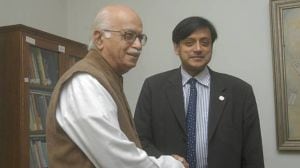Reliance on Gandhi name has been Congress’ Achilles heel
To criticise Gandhi in India is no longer unusual, and that is how it should be. Kanshi Ram and Mayawati can launch a diatribe against the ...

To criticise Gandhi in India is no longer unusual, and that is how it should be. Kanshi Ram and Mayawati can launch a diatribe against the father of the nation. Even Gandhiji’s grandchildren, Rajmohan Gandhi and Sumitra Kulkarni, have written books about their grandfather which are far from idolatry.
Gandhi was of course criticised in his lifetime and he did not discourage it. At one time Tagore had joined issue with him and Gandhi replied point by point to those criticisms.
Ambedkar wrote irreverentially about Ram and Krishna who are worshipped in virtually every Hindu home. The two avtars’ of Indian mythology determine our psyche, our role models, our idiom. But neither criticism of Gandhi nor of the gods Ram and Krishna have invited the howls of protest that censure of Rajiv Gandhi has done. Congressmen went to town against poor R Venkatraman for his references to Rajiv in his memoirs, though he had also praised the Congress leader.
And now comes the latest quake. Congressmen have taken Narasimha Rao to task for deigning to defame Rajiv Gandhi. (Rao’s lawyer told a designated CBI court last week that Rao, who was then the External Affairs Minister, had very little role to play in the St Kitt’s forgery case as he was just following instructions issued to him directly from the office of the then prime minister Rajiv Gandhi.) Kesri has dubbed the act as “hateful” in an interview; his political secretary Tariq Anwar has said it is against all civilised conduct to “denigrate” a dead leader by shifting the blame to him.
As it happens, the views expressed in court which triggered off a wail of protest were not that of Narasimha Rao. For the case has not yet reached the trial stage for Rao to open his cards on what his defence will be. His lawyer was merely drawing the court’s attention to the evidence on record before the CBI, like the letter written to the CBI by Nahata or the deposition of S K Singh or the repeated manner in which the names of Satish Sharma and then OSD to Rajiv Gandhi R K Dhawan figure in the various testimonies but do not figure in the charge-sheet.
And he was using this material to say that the charge-sheet against his client was not maintainable. It is not Rao who has said that PMO, or Rajiv Gandhi, was involved at least not yet. And yet, even a reiteration of the evidence gathered by the CBI has created a ruckus. Had Rao made that statement, it would have only confirmed what the world has suspected for eight years.
It shows that Rajiv Gandhi continues to be a holy cow in the Congress even seven years after his death. It brings into focus the character of the party and the reasons for its decline. And it demonstrates once again how sycophancy can distort history and the rule of law.
Let’s be clear. Loyalty to the dead leader is not the guiding motive of most Congressmen. Staying on the right side of 10 Janpath is. So far. It is only now that Sonia Gandhi has become a primary member of the party. But she has managed to remain relevant in the party through the mystique she has developed around her for the last seven years, and enjoyed a position which is rare by any standards.
No Congressman dared oppose her because she has kept alive the possibility of her entry into active politics all these years, and they harbour the hope that the name of the Nehru-Gandhi family may still work.
Kesri takes on Rao to curry favour with her in the ongoing battle in the party. Pawar offers to make way for her to beat Kesri in the race to win her goodwill. Congress leaders want to use her in their factional battles against each other. For others she holds out the promise of votes which seem elusive otherwise. Fifty years of power have made them too soft and degenerate to exercise the only real option of going back to the people and rebuilding their credibility and organisation.
But if Congressmen think that Sonia can wave the magic wand for the party, they are mistaken. India of 1997 is not the India of 1984 or even of 1990. Even Indira Gandhi, in her heyday, was not sure of winning the 1984 elections with all her charisma and P C Alexander has indicated this in his book.
Rajiv Gandhi for all his charm and the politically correct lineage, brought the party from 400 plus seats to just over 200 and pollsters had predicted that this would have been under the 200 mark had he lived to complete the electoral process.
If Sonia campaigns, she will certainly attract crowds (but then so did Maneka Gandhi at one stage). She may enthuse an otherwise demoralised rank and file of the party. She might make a difference in states where the Congress is in number two position like Karnataka (where there is an upswing in the party’s fortunes anyway), Andhra Pradesh, Kerala and the north east with the Christians, with tribals in Madhya Pradesh and she may well wean away some of the upper caste vote from the BJP in UP.
But a parliamentary majority for the party? That is a tall order. On the flip side she will also give an impetus to the BJP which will use the Italian card to attack her.
Reliance on family rule stems from the age old caste system which is based on birth. And the truth of the matter is that the party’s dependence on one man or woman has stunted the process which would have thrown up new leaders naturally over the years instead of producing parochial, power hungry politicians.
The confusion in the Congress about what it stands for has robbed the party of its vote bank. Indira Gandhi began to put together an alternative coalition after the appeal of her populist slogans like garibi hatao’ waned in the early eighties and the minorities began to desert her.
Before her death she converted the Punjab problem into a Hindu-Sikh one, and used the then prevailing climate of insecurity in the country in the wake of Operation Bluestar to play on the Hindu sentiment. She forged an alliance with the Shiv Sena and toppled the elected government of Farooq Abdullah.But the party moved away from its familiar secular moorings. It never found its anchor again, though it won a reprieve in 1984 because of her assassination and again in 1990 because of her son’s death.



- 01
- 02
- 03
- 04
- 05




























